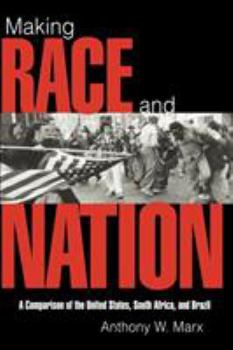Making Race and Nation: A Comparison of South Africa, the United States, and Brazil
(Part of the Cambridge Studies in Comparative Politics Series)
Select Format
Select Condition 
Book Overview
In this bold, original and persuasive book, Anthony W. Marx provocatively links the construction of nations to the construction of racial identity. Using a comparative historical approach, Marx analyzes the connection between race as a cultural and political category rooted in the history of slavery and colonialism, and the development of three nation states. He shows how each country's differing efforts to establish national unity and other institutional...
Format:Paperback
Language:English
ISBN:0521585902
ISBN13:9780521585903
Release Date:October 1998
Publisher:Cambridge University Press
Length:412 Pages
Weight:1.30 lbs.
Dimensions:1.1" x 6.0" x 9.0"
Related Subjects
Africa Americas Anthropology Brazil Cultural Discrimination & Racism History Humanities Minority Studies Political History Political Science Politics & Government Politics & Social Sciences Race Relations Social Science Social Sciences South Africa South America Specific DemographicsCustomer Reviews
3 ratings
a very different perspective
Published by Thriftbooks.com User , 15 years ago
this book outlines the state-formation of south africa, brazil and the united states, and links those state-formation practices by race and racism. i recommend!
The 'race' to build 3 nations
Published by Thriftbooks.com User , 23 years ago
In looking at race it's necessary to get perspective. Travel opens up new vistas. We perceive ourselves one way, others around the world see things differently. What countries come to mind when you think about racism? South Africa definitely; but now that the country has majority rule, it's immediately less racist. Austria, Japan and Yugoslavia also come to mind, but they're not multiracial societies. That Anthony Marx has chosen to compare racial policy in Brazil, South Africa and the US, seems to confirm the widely held world view that the US is one of the most racist nations in the world. Is this true? What do these three nations have in common in their history of segregation? Marx states that the US and South Africa practiced policies of segregation principally for the purpose of "state and nation building". He argues that in both cases the ruling white elite were faced with crises; problems of prosperity and national order. In South Africa, following the Boer War of 1899-1902 there was no chance of unity among Afrikaners and British settlers. In the US, the experience of Radical Reconstruction following the Civil War, was, for some, akin to rubbing salt into fresh wounds. Marx states that in order to achieve accomodation among whites, blacks were made scapegoats. It's not surprising then to learn that the 1870's were when the first Jim Crow laws were passed in the US and the early 1900's saw the first South African Apartheid acts.Where does Brazil fit in? Marx says that racism is as prevalent there as it is here but it's characteristics are different. There is a pervasive preferrence for 'whiteness', seen in attempts to 'Europeanize' the country through encouragement of immigration from the continent. Brazil however did not institutionalize racism as South Africa and the US did; interracial marriages were never illegal in Brazil. Also, because of multiple color categories of Brazilian citizens there was no possibility of the emergence of rigid, 'caste-like', color classifications that developed here. South Africa had 'coloreds' but they were caught in political 'no-mans-land' in the battle between the bantu majority and white minority. It's an interesting and thoroughly reasoned proposition that Marx developes and expounds on in his book. The comparisons between the US and South Africa are nothing new, but the addition of Brazil as a counterpoint to the others is rather unique.
Making Race and Nation: One step foward, one step back
Published by Thriftbooks.com User , 24 years ago
Anthony Marx's comparative study on the construction of race in the United States, Brazil and South Africa is promising if one wants a general historical overview about how race was constructed in each setting. Marx emphasizes how each state, in its own process of state building, constructed racial/racist ideologies to unify the white power structure at the expense of Blacks. He explores the institutions of colonialism, slavery and apartheid to make his case. He also explores how the ideology of black nationalism emerged as unifying response among Blacks to resist white domination. The book is a good read, however his historical account is completely male biased. Marx fails to consider the role gender played in the construction of these racial ideologies. His account is state-centered, which effectively excludes other important social and political factors in the formation of race identity. This becomes painfully clear in the chapter on Black racial identity, mobilization and reform in the U.S. Also, Marx relies too heavily on secondary sources, which dampens the reliability of his analysis.






